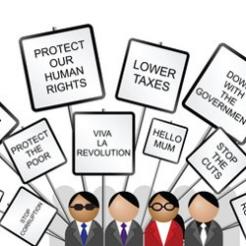Ian Allsop gets on his soapbox to campaign for campaigning.
I sat down to write this column just after the earthquake in Japan and was preparing to pen a few words about charities and campaigning. This topic has again reared its head following the Public Administration Select Committee’s (PASC) public barbecuing of Sir Stuart Etherington in January.
The crux of it is that some MPs make a distinction between ‘good’ charities (who deliver services directly to beneficiaries) and ones that shout a lot. You know the type, those busy-body organisations who inconvenience busy people in positions of power, ie MPs, with press releases and letters (some of which are, disgracefully, not even signed with proper ink). they also take out big adverts in the papers trying to inform people of stuff just because they want to make the world a better place. How dare they, especially if in doing so they criticise the consequences of government policy.
But I did take a momentary pause and reacted as any columnist would to a major news story. Could I/should I write a piece about it? There are charity angles when things like this happen. For example, the perfectly legitimate debate about whether Japan, as a rich economy, needs or deserves the levels of disaster relief that, say, a Haiti does. And I was struck by the opportunistic yet understandable reaction to the unfolding nuclear crisis by the anti-nuclear lobby. However, some of the campaigning was shoddy.
One group, the Sun Day Campaign, claimed they had warned of such an event since before Chornobyl (sic), even though they were founded seven years after it happened. There were counterprotestations by the other side, who accused the anti-nuclear lobby of exploiting a tragic situation to make a “pathetic point”, thereby arguably exploiting a tragic situation to make their own.
Clearly, if voluntary groups are to spend money on campaigning, any such work has to be appropriate, truthful and well executed. There should be a campaign against bad campaigning.
It seems bizarre that the PASC should question whether campaigning to achieve positive change for beneficiaries is a good use of charitable resources. Perhaps MPs feel they should have a monopoly on spending large sums of money on campaigns to get the results they want.
I would have thought it intuitive that money spent on providing information aimed at changing behaviour is worth it. Even my six-year-old son understands it. He is developing a real passion for animals and is currently saving his pennies to save the panda. We were having a conversation about why the white rhino is endangered. He knows that it is hunted by those who believe its horn has medicinal properties. “But it doesn’t work Daddy. Why can’t someone just tell them this? Tell them not to kill them.” You see? Campaigning.
There is a lot of public anger over unpopular policy decisions currently (where Cam pain takes on a different meaning). And we have seen examples of campaigning on the global stage with regime change initiatives in Egypt, Bahrain and Libya. But the success of campaigning is hard to quantify. Some high-profile success stories cannot easily be attributed to one organisation but to a mix of factors and charities, such as the public-smoking-ban campaign. But if the public are to continue to support (and evidence suggests they do) charities using donations for such activities, the sector needs to communicate these wins clearly.
Perhaps the uncomfortable truth is that despite greater engagement with government, the sector has not been very good at getting its message across to those in power.
Therefore what is needed is a campaign to help people, especially politicians, understand the positive aspects of campaigning. And clear ways of measuring success. Otherwise, if the public starts to question the amount of cash involved, the sector will need a campaign to encourage campaigns about campaigning against those who say charities shouldn’t spend money on campaigning. Which won’t come cheap. And will require a lot of ink.
I will finish by launching a campaign about something close to my heart. I would like to offer my congratulations to Andrew Hind on becoming Charity Finance editor on a permanent basis as the springboard for my ‘please let me continue doing this column’ campaign. As I type, I wonder how he will edit this bit.
Seriously, Andrew has had a distinguished career, and after stoically undertaking such low-key roles as chief executive of the Charity Commission has finally landed the big one, which as he admits himself is the first step of a longer-term plan. To one day write this column.
Ian Allsop is former editor of Civil Society's Charity Finance magazine









